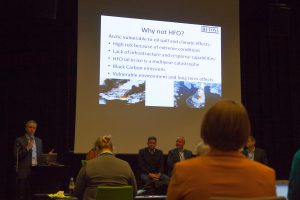
Hallstein Havåg of Bellona speaking at the event today
Tromsø, January 25, 2017: – A world-leading expedition cruise ship operator today joined international environmental organisations to spearhead the protection of Arctic communities and ecosystems from risks posed by the use of marine heavy fuel oil (HFO) to power ships, at the Arctic Frontiers conference in Tromsø, Norway.

Daniel Skjeldam speaking during panel discussion
“An accident involving a mega ship and spill of heavy fuel oil in the Arctic would represent an environmental disaster”, continued Skjeldam. “If heavy fuel oil is spilled in cold Arctic waters, it will have larger consequences than anywhere else. The Arctic deserves sustainable growth and innovation, and the industry needs to move first.”

Daniel Skjeldam of Hurtigruten signs the Arctic Commitment
“The debate on HFO is over – now action is needed. Banning the use of heavy fuel oil to power Arctic shipping will not only minimise the risk of spills, but will also help reduce climate-warming emissions in the region”, said Christoph Wolff, Managing Director of the European Climate Foundation, another member of the Clean Arctic Alliance. “The Clean Arctic Alliance is calling on the international community to sign up to the Arctic Commitment, so that with one voice, we can urge the IMO to phase out HFO from Arctic waters.”
-
The Clean Arctic Alliance:
-
Alaska Wilderness League, Bellona, Clean Air Task Force, Danish Ecological Council, Environmental Investigation Agency, European Climate Foundation, Friends of the Earth US, Greenpeace, Icelandic Nature Conservation Association, Nature And Biodiversity Conservation Union, Ocean Conservancy, Pacific Environment, Seas At Risk, Transport & Environment, WWF Arctic Programme, and WWF Finland.
-
-
Hurtigruten, international expedition cruise operator
-
Arctia, Finnish icebreaker operator
-
Eyak Preservation Council (USA, Alaska)
-
Defenders of Wildlife
-
Oceana
-
Audubon Alaska
-
International Cryosphere Climate Initiative (ICCI)
-
Native Land Conservancy (USA)
-
Lewis Pugh, UNEP Patron of the Oceans and polar swimmer
-
Bernice Notenboom, explorer, filmmaker and journalist
-
Dr Sian Prior, Lead Advisor to the Clean Arctic Alliance
-
Daniel Skjeldam, CEO, Norwegian expedition cruise line Hurtigruten
-
Hallstein Havåg, Director of Policy and Research of Bellona
-
Christoph Wolff, Managing Director of the European Climate Foundation
-
Bernice Notenboom, Journalist, polar explorer, maker of Seablind documentary
-
Tor Christian Sletner, Norwegian Shipowners Association
-
Heavy fuel oil (HFO) is a viscous fossil fuel used to power ships and deliver goods all over the world. As the dirtiest and most polluting of fuels, HFO is a problem wherever it’s used, but if spilled in colder regions, such as Arctic waters, HFO breaks down even more slowly and can devastate livelihoods and ecosystems.
-
HFO produces harmful and significantly higher emissions of air pollutants, including sulphur oxide, nitrogen oxide, particulate matter, and black carbon (BC). When emitted and deposited on Arctic snow or ice, the climate warming effect of black carbon is at least three times more than when emitted over open ocean.
-
In December 2016, Canada and the US announced a joint “phase down” of HFO from their respective Arctic regions (see Clean Arctic Alliance response). In September 2016, both countries had formally notified the International Maritime Organization that a “heavy fuel oil spill in the Arctic could cause long-term damage to the environment”.
-
During the IMO’s MEPC 70 meeting in October 2016, three papers addressing the HFO problem were presented, along with one on Arctic food security. In response, several Arctic countries, and in an unusual move, the IMO Secretary-General Kitack Lim, stated that they shared the concerns summarised by the papers and on the need for further consideration of the risks of HFO (see Clean Arctic Alliance response).
-
The Clean Arctic Alliance believes that a ban on HFO in the Arctic can be achieved by 2020 if governments and business demand action by the International Maritime Organization to ban the use of HFO. The Alliance encourages the shipping industry switch to higher quality, alternative fuels, before such a ban is in place.
About Hurtigruten
Hurtigruten was established in 1893 as a local transportation and shipping service along Norway’s rugged and beautiful coastline. 125 years later, 11 custom-built expedition ships call to the 34 ports between Bergen and Kirkenes every day of the year.
With sustainability as its core value, Hurtigruten is also the world leader in expedition travel, with a growing state of the art expedition fleet sailing the waters of Arctic, Antarctica, South America, the Amazon rainforest and other unique destinations. Hurtigruten has chosen not to use heavy fuel oils in any of its ships.
About the Clean Arctic Alliance
The following not-for-profit organisations form the Clean Arctic Alliance, which is committed to achieving the phase out of HFO as marine fuel in the Arctic:
Alaska Wilderness League, Bellona, Clean Air Task Force, Danish Ecological Council, Environmental Investigation Agency, European Climate Foundation, Friends of the Earth US, Greenpeace, Icelandic Nature Conservation Association, Nature And Biodiversity Conservation Union, Ocean Conservancy, Pacific Environment, Seas At Risk, Transport & Environment and WWF.
More more information visit http://www.hfofreearctic.org/





